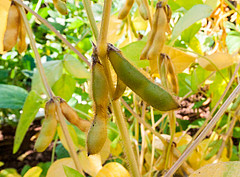Schwergewichte der Forschung
More Pulses for Europe [21.06.17]

Hohenheim researchers are focusing on the successful history of lentils and soy. | Image: University of Hohenheim / Sacha Dauphin
Legumes are a very special type of crop, they are characterised as a sustainable source of highly nutritious food and feed. ‘Sustainable’, since legumes require no inorganic nitrogen fertiliser, and this efficiency saving is added to by improvements to soil qualities and total productivity when deployed in a modern crop rotation. The nitrogen demand of legumes is met naturally via a symbiosis with soil bacteria that is contained in legume root nodules.
Despite their benefits, legume based systems have not been adopted in common farming practice, due largely to the fact that their potential profitability is questioned. Pulses only grow on 2-3 per cent of the arable land in the EU. That makes the EU highly dependent on imports of feed-legumes and fossil energy, which is required for the production of inorganic nitrogen fertilisers.
Projekt TRUE |
Mit insgesamt 5 Mio. Euro fördert die EU das Projekt TRUE (TRansition paths to sUstainable legume-based systems in Europe) im Rahmenprogramm Horizont 2020. Beteiligt sind 24 Partner aus 10 Ländern. Koordiniert wird es vom James Hutton Institute in Schottland. Hohenheim erhält über vier Jahre insgesamt 541.866 Euro.
Projekt-Homepage
Facebook und Twitter: @TrueLegumes |
A new, European-wide research project intends to change this. Plant cultivation experts, agricultural economists, and the Hohenheim Research Center for Global Food Security and Ecosystems (GFE) from the University of Hohenheim are participating. For this work, they are receiving over 540,000 euros from the 5-million-euro project - one of the major research projects at the University of Hohenheim.
In the project TRUE (TRansition paths to sUstainable legume-based systems in Europe), 24 project partners from 10 European countries and Kenya have gotten together to explore and develop sustainable legume-based farming systems and agri-feed and food chains in the EU. The group includes not only researchers from different backgrounds, but also businesses operating in legume commodity production and processing and other actors from the practice.
Legumes reduce need for mineral fertilisersAt the University of Hohenheim, plant cultivation expert apl. Prof. Dr. Sabine Gruber is carrying out two of the 24 total case studies in the project together with Dr. Sabine Zikeli, Coordinator for Ecological Agricultural and Consumer Protection. The researchers are focusing on the successful history of lentils and soy. Their data is to help better understand why these two types of legumes are so successful.
Project TRUE aims to unite economy and ecologyAt the University of Hohenheim, the agricultural economists under the leadership of Prof. Dr. Enno Bahrs and Prof. Dr. Christian Lippert are looking at the economic side of legume cultivation. The lack of yield security and economic efficiency are considered the largest obstacles currently. The researchers are examining what economic effects would arise from expanding cultivation and whether production would be competitive.
The work at the University of Hohenheim is being coordinated by the Hohenheim Research Center for Global Food Security and Ecosystems (GFE).
Innovation for more healthy and profitable legume-based productsThe whole diversity of available legume species and pedo-climatic conditions across Europe is covered by TRUE, looking at 24 case studies from the production and use of crops such as beans or chickpeas for healthy dishes in Portugal, to the processing of peas into beverages in the UK to the marketing of organic traditional lentils in Germany.
Schwergewichte der Forschung |
Als Schwergewichte der Forschung gelten an der Uni Hohenheim Forschungsprojekte ab 250.000 Euro Fördersumme für apparative Forschung bzw. 125.000 Euro für nicht-apparative Forschung. |
TRUE innovates across the supply chain – from the development of novel farming practices such as the use of pulses as “vegetable fertilisers” or “living manures”, to the testing of new food technologies for improved feed and food formulation. Feed innovations include use of lupins and faba beans for novel aquaculture feeds. Additionally, there will be sustainability assessments of various legume-based systems.
Project TRUE aims to unite economy and ecologyTRUE wants to harness the environmental and social benefits and potentials of legumes, e.g. reducing environmentally damaging greenhouse gas emissions and water pollution as well as for a healthier nutrition with high value proteins while at the same time increasing the commercial competitiveness of EU grown legume crops. Specific recommendations will be proposed to influence relevant policies, such as the EU’s Common Agricultural Policy.
TRUE invites legume stakeholders to connect with the project to build a European network for the promotion of these crops.
Text: Elsner